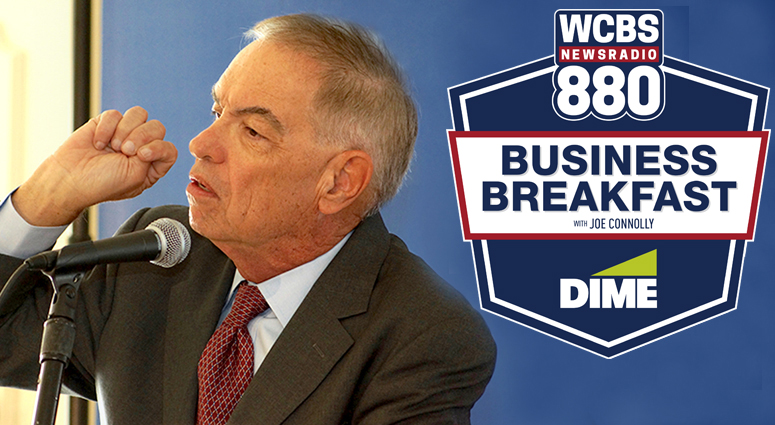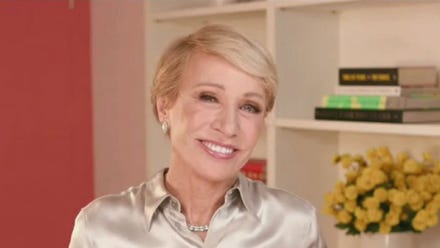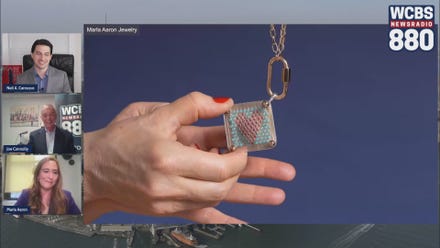
Neil A. Carousso produces NewsNation original “Kurt’s Country” – a celebration of country music and a slice of Americana with host Kurt Bardella.
-
Fall 2021 WCBS Virtual Business Breakfast: Building Back Stronger
Post Views: 775Presented by Dime Community Bank
By Joe Connolly and Neil A. Carousso
NEW YORK (WCBS 880) — Businesses continue to face unprecedented challenges from labor to supply shortages, but the COVID-19 pandemic has also created opportunities in crowded markets. There was a sense of optimism and hope for small businesses on the WCBS Virtual Business Breakfast, presented by Dime Community Bank.
“We saw people grow sometimes as big as 13-times over because they moved from wholesale to direct-to-consumer,” Shopify’s Head of Spaces Cody DeBacker told host Joe Connolly.
By selling direct-to-consumer, businesses grew their margins and Shopify’s e-commerce tools assisted wholesalers and brick-and-mortar retailers in making a successful pivot to digital. It has opened a new revenue stream for many businesses.
“We believe that anyone in the world can become an entrepreneur with the right tools and we want to put those into the hands of the right people,” said DeBacker.
Shopify, which started in 2004 as a snowboard company called Snowdevil before realizing the greater opportunity to provide e-commerce solutions to businesses, recently opened an entrepreneurial space in SoHo where they provide one-on-one business coaching and house full-scale photo and podcast studios. You will get an inside look at Shopify NY on the WCBS Virtual Business Breakfast.
FINDING NEW OPPORTUNITIES
A theme that emerged on the program was “opportunity.” Leading startup investor Kevin P. Ryan, founder and CEO of AlleyCorp, notes that opportunity exists whether an industry is thriving or suffering.
“What I ask everyone to think about is: ‘What is expensive in your life or in your business?’ ‘What’s hard to get?’ ‘What has poor service?’ and those are things where someone can do it better. Almost all ideas come out of that problem,” Ryan said.
The Internet entrepreneur pointed to Harry’s and Dollar Shave Club’s disruption of the personal care products industry as an example of the market shifts that are taking shape due to the pandemic.
“Both Dollar Shave Club and Harry’s are both billion dollar companies just going after that one small sub-sector,” Ryan explained, adding, “You’re going to see other examples of that that are occurring in deodorant, that are occurring in skincare, in suntan lotion – across the board. No area is off touch to entrepreneurs now.”
He told Connolly it was previously unheard of for a small business to try to breakthrough in such a crowded market, but leaner businesses actually have an advantage.
“When you’re a startup, you want to be competing with very large companies, which sounds the opposite of what you would think. But, it’s always more dangerous to be competing with a small, scrappy startup that’s moving very quickly that’s getting very good people,” he said. “Large companies have 50 different priorities; they don’t get to it.”
LEAN AND MEAN
Zola, the online wedding registry, gained market share by filling a void within a crowded field. Ryan founded Zola through his firm AlleyCorp when he saw large department stores had very limited wedding registries.
“You had to offer plates and glasses and forks and things like that, which made sense when the bride and groom were 22 in 1960 and they’re moving into their first apartment. But now, a lot of people had been living together. They’re 32 years old. They already have some plates and knives and forks,” he said.
Zola separated themselves from the department stories by offering cash gifts and experiences like Knicks tickets. When stores like Macy’s and Bloomingdale’s caught on, Zola introduced adjacent services like online invitations and full-service wedding planning. Ryan said their larger competitors couldn’t keep up.
DIGITAL SUCCESS STORY
Connolly invited the founder of another business Ryan invested in on the WCBS Virtual Business Breakfast. Marc-Kwesi Farrell launched Ten To One Rum in 2019 after nearly three years as the youngest vice president at Starbucks where he worked under former chairman and CEO Howard Schultz who has since become Farrell’s friend and mentor.
The original plan for the Trinidadian-born entrepreneur was to make it in traditional retail with a new, premium rum brand. But, the pandemic forced him to explore a direct-to-consumer business model and begin marketing his product differently. That’s when Farrell realized that his story was leading to sales as much as the quality of his product.
“Our business is not just a story of creating another premium rum brand, it’s actually also finding a way to offer a more unique point-of-view on the culture – Caribbean culture, actually – that surrounds the business and the brand,” he told the WCBS Virtual Business Breakfast. “The passion and the purpose that surround it certainly seems to be a message that has resonated.”
Ten To One Rum hosts events and experiences around its brand while boasting more than 12,400 followers on Instagram. Farrell recently brought in singer and songwriter Ciara as an investor, co-owner and director.
“These are the success stories,” DeBacker beamed.
“They want to see the real you. They don’t just want a product. They want to be a part of your story, they want to be a part of your brand,” the Shopify executive said of successful digital marketing content. “It’s about creating a meaningful story that they can get behind.”
See winning sales and marketing strategies on the free WCBS Virtual Business Breakfast, presented by Dime Community Bank above.
MEET OUR EXPERTS:
Kevin P. Ryan
CEO and Founder, AlleyCorp
Photo Credit: Kevin P. Ryan Kevin P. Ryan is one of the foremost Internet entrepreneurs in New York, having founded and is Chairman of several businesses, including AlleyCorp, Zola and Nomad Health. Previously he founded and was Chairman of MongoDB, Business Insider and GILT. Combined, these companies have raised more than $700 million in venture capital funding and currently employ almost 2,000 people. Previously, Kevin helped build DoubleClick from 1996 to 2005, first as President and later as CEO. He led DoubleClick’s growth from a 20-person startup to a publicly traded global leader with over 1,500 employees. In 2013, Kevin was named one of “The 100 Most Influential New Yorkers of the Past 25 Years” by the Observer.
Aside from his professional responsibilities, Kevin serves on the board of Mercy Corps, is Vice Chairman of The Partnership for New York City, is a member of the CFR Committee on Foreign Affairs, is on the Board of TECH:NYC and is Director Emeritus for Human Right Watch. He previously served on the boards of Yale Corporation, INSEAD, the Direct Marketing Association, The Ad Council, HotJobs and the advisory board of Doctors Without Borders. He holds a B.A. from Yale University and an M.B.A. from INSEAD graduate business school.
Cody DeBacker
Head of Spaces, Shopify
Photo Credit: Cody DeBacker Cody DeBacker is the Head of Shopify Spaces. His projects and experiential activations have landed coverage in Forbes, The New York Times, Hypebeast, Complex, and hundreds of other publications around the world.
Cody’s current role is focused on leading Shopify’s physical spaces, and most recently, his team opened the first ever Shopify entrepreneurial community space in New York that features free one-on-one business support, commerce training workshops, and thought provoking panels and events with the industry’s top entrepreneurs and merchants.
He has also lead a team that participated in consumer conventions around the world such as Star Wars Celebration, NYCC, Complexcon, Hypefest, Family Style, and more. Cody is also the owner of 143 Worldwide, a DJ, and has been working in the fashion, trade show, and tech space for more than a decade.
Marc-Kwesi Farrell
Founder of Ten To One Rum
Photo Credit: Ten To One Rum Marc-Kwesi Farrell launched Ten To One Rum in 2019 after nearly three years as the youngest vice president at Starbucks. Ten To One Rum hosts events and experiences around its brand while boasting more than 12,400 followers on Instagram. Farrell recently brought in singer and songwriter Ciara as an investor, co-owner and director.
-
VIDEO: Why Barbara Corcoran Believes Best Investments are in People
Post Views: 910By Joe Connolly and Neil A. Carousso
NEW YORK (WCBS 880) — Barbara Corcoran, the self-made “queen of New York real estate,” has always put her customers and her workers, first. That mantra is guiding her businesses out of the COVID-19 pandemic.
“I don’t buy businesses. I buy people,” Corcoran told Joe Connolly and Neil A. Carousso on the latest WCBS Small Business Spotlight, sponsored by Dime Community Bank.
“The reason I was able to build such a large company is because I adored my employees and would do anything for them at any time – anything for them – they came first,” she said. “You have to have that attitude toward employees if you want to do well with them.”
A tight labor market has left many job postings unfilled. The “Shark Tank” star said the businesses that have survived the pandemic are growing, but their biggest challenge is hiring and retaining workers.
“It’s not just at your local restaurants, it’s at your dry cleaners, it’s at your technology companies. Everyone across the board is having a hard time attracting employees,” she said.
Corcoran noted one way to limit turnover is to pay more competitive salaries. She explained many customers are willing to support small businesses in their communities.
“They’re very amiable to helping small businesses if they think they’re helping a good business get ahead. So, you can pass on a lot of those costs, but you have to pay people more,” said Corcoran.

Barbara Corcoran listens to a pitch on ABC’s “Shark Tank.” (Photo Credit: ABC) She told WCBS 880 businesses must be more flexible with remote work, too.
“You have to give them the latitude and the freedom to work different hours, which now, people have been spoiled by because of COVID. Anybody who’s dictating that you must be here 9 to 5, come every day of the week, is not getting the employees because employees have other choices. They just move on and get a better boss so you have to be a phenomenally good boss and do everything you can to help that employee and that’s how you get them,” Corcoran said.
She describes “good bosses” as those who put the needs of their customers and employees before their own. She believes that’s the primary reason that The Corcoran Group blossomed into a $5 billion company when she sold it in 2001.
Corcoran called companies that are still not embracing remote work “stupid.”
“If you’re not budging, you’re stupid because you’re not doing what is the basic, core essence of all business: it’s called change,” she said, noting the seismic shifts businesses have been forced to adapt to over the past 19 months. “Let me tell you, if you don’t acknowledge the change that happens, you don’t stay in business.”
The famous entrepreneur said on the WCBS Small Business Spotlight that the job of the business owner is to spot trends early and direct their team “on which ways to run.” That’s how, she said, small businesses become big businesses.
“You know, the great advantage I saw early in my business when I looked around and saw my big competitors was I picked up on their attitude. They were big shots. The minute I saw everyone playing ‘big shot,’ I knew I had a shot,” said Corcoran, adding, “Most big businesses think they’re competing with other big businesses. They’re not. That’s not the enemy. The enemy is the little business that’s going to come up from behind and bite you in the butt.”
She said she tells companies like Ernst & Young in corporate speeches to think small. As for small businesses, Corcoran advises to learn everything about operating the business; those that are hungry will win the race.
Corcoran turned a $1,000 loan from a boyfriend in 1973 into a multi-billion dollar real estate empire. She told Connolly and Carousso that she budgeted every cent and hustled for every sale to keep her little business alive in the early days. That’s what she’s seeing new entrepreneurs doing today in season 13 of ABC’s “Shark Tank.”
“So many of the entrepreneurs that were standing before us either got fired or left their job,” Corcoran said. “They had part-time things they liked to do and they just decided they had time to think about it. They weren’t happy with their life and that was the time to make a big change and they took their part-time gig and they made it a full-time business. And, ironically, those were the strongest businesses we saw.”
See what it takes to make your dreams a reality on the WCBS Small Business Spotlight featuring Barbara Corcoran above.
-
No Laughing Matter: Caroline’s on Broadway Struggles Despite Theatres Reopening
Post Views: 664By Joe Connolly and Neil A. Carousso
NEW YORK (WCBS 880) — Broadway’s return is not providing the comedic relief clubs in the theatre district had been hoping.
Caroline Hirsch, founder and owner of Caroline’s on Broadway, told Joe Connolly and Neil A. Carousso she has never experienced a challenge like the COVID-19 pandemic in her four decades in business.
“Business was going very well until Delta hit again and people were alarmed about going out and being in crowds,” she said of the dominant strain of the virus on the WCBS Small Business Spotlight, sponsored by Dime Community Bank.
The iconic comedy club reopened Memorial Day Weekend with a ton of pent-up demand for laughs. It took a turn late summer.
“When the vaccine mandate came out, it really curtailed business,” said Hirsch, explaining, “We have people who are canceling because somebody in their group is not vaccinated so they won’t come.”
She told WCBS 880 that she believes vaccine mandates are hurting New York’s live entertainment industry, but elevated COVID-19 infections are driving hesitancy as well.
“Some comedians don’t want to go on tour; they want to wait until 2022. So, therefore, we have a bit of a talent shortage,” Hirsch said. “First, we had a labor shortage. We couldn’t hire enough waiters and waitresses. We couldn’t hire enough staff people in the kitchen.”

Carolines On Broadway Owner Caroline Hirsch Photo credit Astrid Stawiarz/Getty Images for Ms. Foundation For Women Caroline’s on Broadway had also been relying on private parties this fall to recover some losses, but some events have been postponed to next year. As a result, she predicts businesses in the Theatre District will experience a slow recovery.
A handful of Broadway shows returned last month at full capacity for fully vaccinated and masked audience members, cast and crew. But, on opening night, Hirsch asked workers in a garage how many cars arrived and found out only two people drove in to see a show.
“I think we need to be realistic about this and not just say, ‘Oh, Broadway’s reopening,’ but Broadway’s going to have a really tough time reopening. And, I think that we all need to help them out. I think people have to make a concerted effort to go out and buy a ticket to Broadway,” she said.
Caroline’s organizes the annual New York Comedy Festival, which makes its return to the stage November 8-14 with pop-up shows throughout the five boroughs.
“We’re going to do close to 150 shows around the city,” Hirsch told Connolly and Carousso.
Bill Maher, Marc Maron and Michelle Wolf are among the comics taking the microphone.
“You’ll have a great laugh,” said Hirsch who admits despite all the pandemic challenges and stress, she is still laughing, herself.
Caroline’s on Broadway first opened as a small cabaret in Manhattan’s Chelsea neighborhood in 1981 before moving to the South Street Seaport six years later. It eventually made its home on Broadway in 1992. Hirsch is known for giving Jerry Seinfeld, Jay Leno and countless other comedians their start.
Watch the WCBS Small Business Spotlight video above for ideas on getting Broadway back on its feet.
-
WCBS 880 Weekly Rewind: Shining a Light on Missing Persons Cases; NJ Nurse Has Change of Heart about COVID Vaccine
Post Views: 593Produced by Neil A. Carousso
NEW YORK (WCBS 880) — The case of Gabby Petito has garnered national attention and her family is hoping to bring awareness to other missing persons cases. Lynda Lopez covers some of those and what resources are available for families on The 880 Weekly Rewind.
https://omny.fm/shows/880-weekly-rewind/shining-a-light-on-missing-persons-cases-nj-nursePlus, vaccination mandates lead to more Americans getting the COVID shot. A New Jersey nurse, previously vocal against the vaccine and mandates, told WCBS 880 why she changed her mind and is now promoting the shot.
Lopez also looks at the dangers of the U.S. defaulting on its roughly $30 trillion debt ahead of a fast approaching deadline while President Joe Biden meets with Democrats to urge unity over the $1 trillion bipartisan infrastructure bill and a $3.5 trillion social spending package.
Subscribe and download The 880 Weekly Rewind podcast for in-depth reporting and deeper analysis of the top stories of the week, produced by Neil A. Carousso, for WCBS-AM New York.
-
When to go ‘All In’ on Your Dream Business
Post Views: 624By Joe Connolly and Neil A. Carousso
NEW YORK (WCBS 880) — Risk is assumed when someone starts a business, but oftentimes, entrepreneurs aim for a soft landing. At some point, founders must take a leap of faith.
Marla Aaron left advertising agency McCann Worldgroup in 2012 where she was vice president of communications for its division MRM. Her aha moment came during a business trip in France. Away from her kids, a coffee pot exploded leaving her with burns and she decided to return home. She presented her husband with an ambitious business plan on PowerPoint and left her job a week later to follow her passion designing jewelry.
Aaron told Joe Connolly and Neil A. Carousso on the WCBS Small Business Spotlight, sponsored by Dime Community Bank, that she wishes she started her jewelry business earlier. Even after she did, she felt rejected when she was initially turned down by major retailers and picked up freelance jobs in advertising as a safety net.
“That was probably a mistake and that was a waste of time because I wasn’t doing anything that well,” she said. “I was probably a mediocre consultant and I was doing a mediocre job starting my business. I had to fully pull the rug out and focus 100 percent.”
Her advice for anyone looking to leave their job to start a business or take their side hustle full-time: “You have to do it. You have to go all in in every respect.”
Aaron went door-to-door in New York’s Diamond District selling her first pieces of fine jewelry made from industrial climbing carabiners. When one retailer took an interest, she knew she had a viable business and began designing, selling, and eventually, building the Marla Aaron Jewelry brand.
She had just signed a lease for her showroom on 47th Street between 5th and 6th Avenues in Midtown Manhattan at the start of the pandemic lockdown. Her new space remained empty.
Instagram helped her showcase her products and communicate her story, but she missed the personal touch with clients. Aaron and her employees had been meeting over Zoom at the beginning and end of each work day to keep everyone engaged. That gave her an idea.
“We’re like Zoom is working for us; let’s do Zoom appointments. So, we started doing Zoom appointments, but it wasn’t just like, ‘Hey Zoom with a customer.’ We understood that it required orchestration, rehearsal, dominating the archive of photos that we had so it would be seamless,” Aaron said.
She discovered that the Zoom appointments were most effective when two sales representatives were on each call. One person operates the technical side, showing their catalogue of product photos, while the other representative describes each piece and asks questions to determine the customers’ tastes.
“We just figured it out,” said Aaron.
Figuring it out was not easy, especially during the height of the COVID-19 pandemic when jewelry was far from prospective customers’ minds.
Before COVID, Aaron vowed to donate silver heart lockets to single mothers every year, which was derived out of her own experience. She remembers feeling down on Mother’s Day as a single mom before her second marriage. Her son was too young at the time to understand the holiday and she sat at brunch empty handed while she watched families exchange flowers. So when her business suffered at the outset of the pandemic, Aaron tried to make the most out of a bad situation and lift the spirits of others.
“We call it the ‘Lock Your Mom Project’ and we give them away to single moms. The first year I gave 50 and every year I had doubled it subsequently. And, the first year of the pandemic, we had planned to give out 800. I was thinking, we can do this. We can figure out a way to get this done,” Aaron said.
While the showroom remained shuttered, they found single mothers online and began shipping lockets from Marla’s house for Mother’s Day 2020. Aaron told Connolly and Carousso that’s when they realized they could sell a lot of jewelry virtually.
Marla Aaron Jewelry has more than 112,000 followers on Instagram. But, what those followers don’t realize is that the woman behind the brand is also the one operating the account.
Aaron calls her business “rebellious” in how they’ve bucked traditional jewelry marketing.
“We speak to people in plain language. It’s not covered in fairies and frost and Photoshop,” she explained. “It’s just really honest and authentic and real.”
Aaron sees her jewelry designs as an extension of herself and believes her story resonates with customers.
Today, she employs 18 people who help manage production, marketing, customer service and her wholesale accounts. Aaron continues to design all the jewelry she sells out of her office in the Diamond District.
See Marla Aaron’s creative process, her advice for taking the leap into entrepreneurship, and the new ways of selling jewelry that has helped her expand her reach on the WCBS Small Business Spotlight video above.











